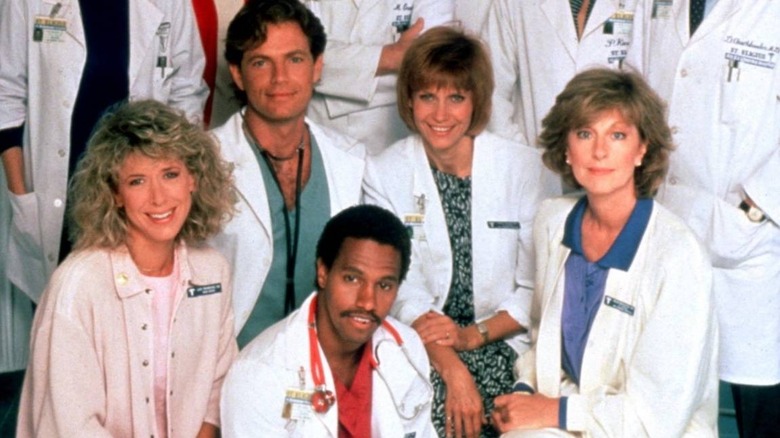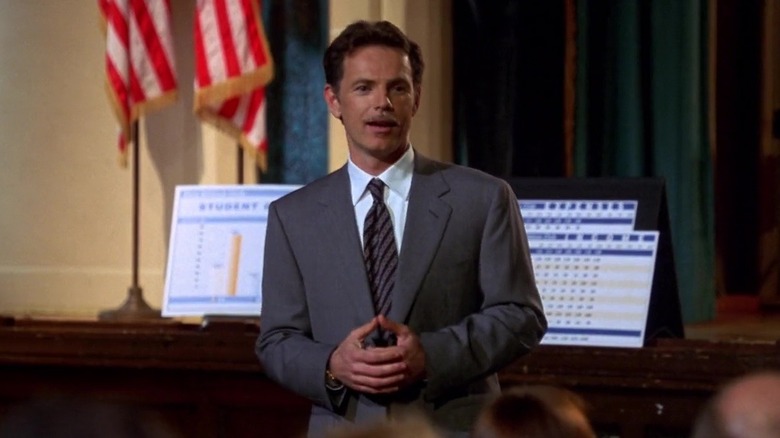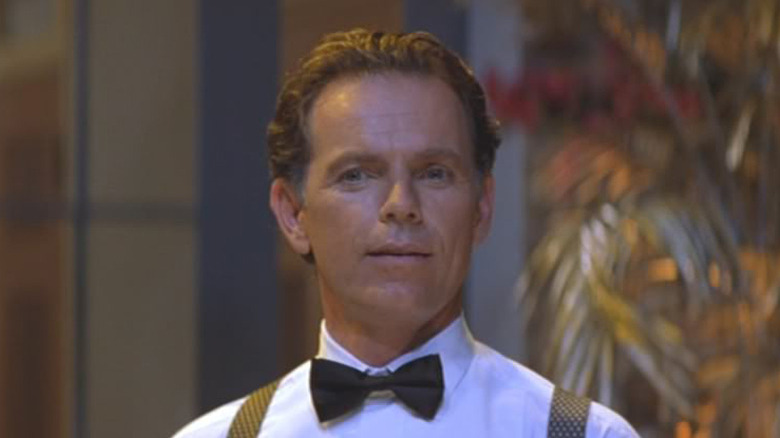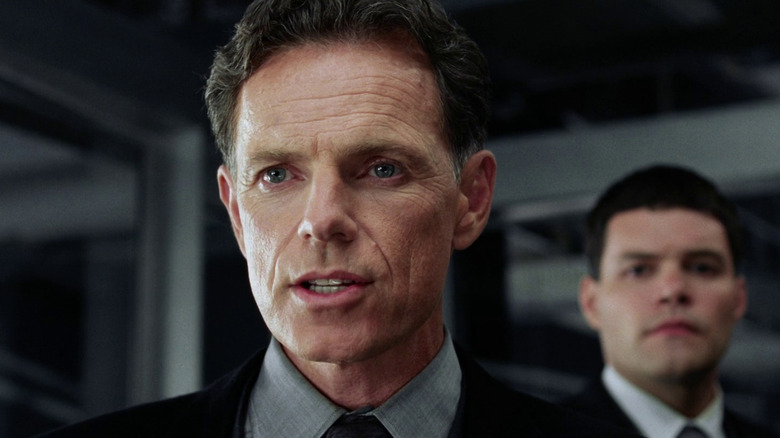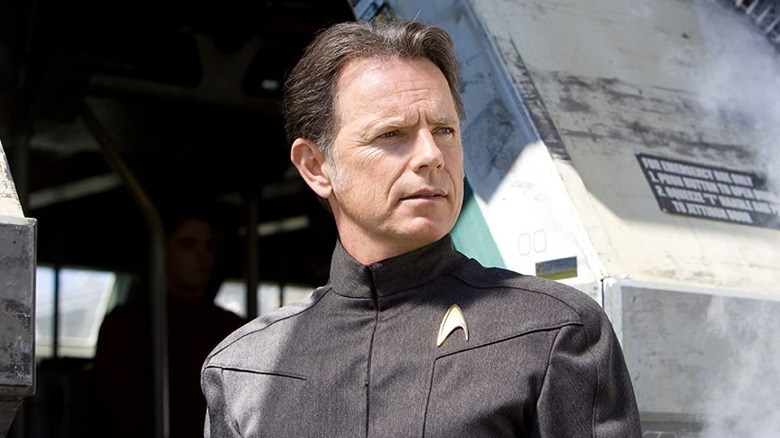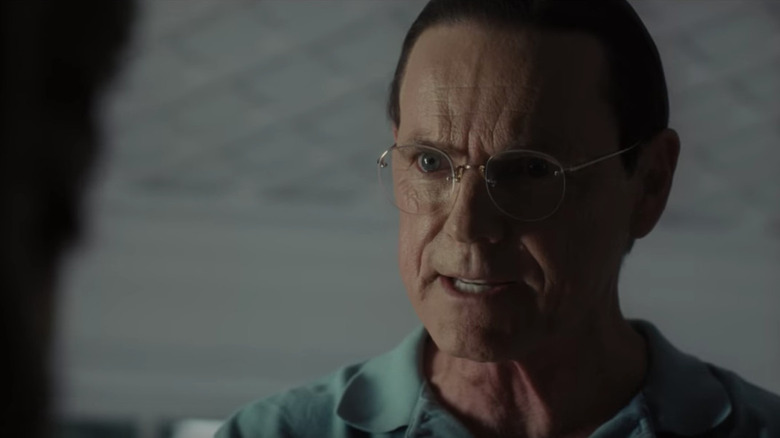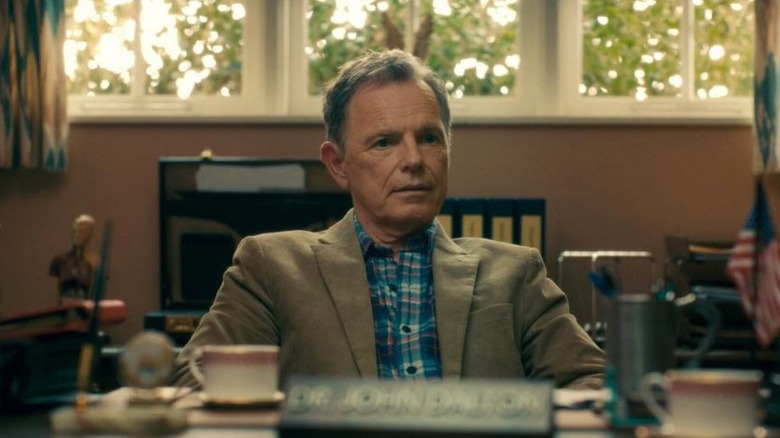Why Dr. Bell From The Resident Looks So Familiar
Medical dramas are a dime a dozen. They've been a staple of television for decades but most operate within the same basic parameters as all the rest. With so much commonality shared among entries in the genre, it falls on the characters to separate a given show from the pack and the characters on "The Resident" have managed to do exactly that. Lead character Conrad Hawkins (Matt Czuchry), the titular resident, is a brilliant doctor tasked with showing new physicians the ropes at the fictional Chastain Park Memorial Hospital. Like many brilliant doctor characters — we're looking at you, Gregory House — Conrad can be arrogant and downright cocky. He also tends to be pretty hard on new doctors, though that's only to get them acclimated to the often shocking realities of modern medicine and the healthcare industry.
The cast of the resident includes other strong characters, including nurse practitioner Nicolette Nevin (Emily VanCamp), whom Conrad eventually marries, for four seasons before her death. Surgical resident Mina Okafor (Shaunette Renée Wilson), completely indifferent to the opinions of others, also had a memorable four seasons on the show before being written off. Fans may also recognize the hospital's elder statesman, Dr. Randolph Bell, the former chief of surgery, former hospital CEO, and current talk show host — it's a long story. He's brought to life by veteran actor Bruce Greenwood, who should be recognizable from a fair amount of projects. Here's why Dr. Bell from "The Resident" looks so familiar.
Greenwood played Dr. Seth Griffin on St. Elsewhere
One of Bruce Greenwood's first major roles came on another medical drama: "St. Elsewhere." The series followed the events at the fictional St. Eligius Hospital — confusingly named for the patron saint of metalworkers, veterinarians, and horses — a drab, rundown teaching hospital in Boston, Massachusetts. Over the course of the show's six-season run, members of the "St. Elsewhere" cast included Tim Robbins, Denzel Washington, Helen Hunt, Howie Mandel, David Morse, and Mark Harmon.
Greenwood joined the show in its fifth season — following Harmon's departure — as the handsome and cocky Dr. Seth Griffin. To say others found Seth difficult would be an understatement. First of all, he allowed a terminal patient to die and then shifted the blame to head nurse Helen Rosenthal (Christina Pickles). He also had a habit of pitting younger physicians against each other. Seth was unable to keep his work and his love life separate, sharing a brief romance with Dr. Jacqueline Wade (Sagan Lewis), which isn't the only thing that out him on the radar of St. Eligius' medical director. Dr. Donald Westphall (Ed Flanders). It probably didn't help when he dated his boss' much younger daughter, Lizzie (Dana Short), later in the series.
He played Dr. Caldicott in Disturbing Behavior
At some point in his fictional medical career, Bruce Greenwood took a turn for the dark side, adding in "sinister" and "maniacal" to his "brilliant" and "cocky" doctor repertoire. The results really shine through in his performance as Dr. Edgar Caldicott in the 1998 teen horror-thriller "Disturbing Behavior," which is essentially "The Stepford Wives" set in the halls of high school academia. When Steve Clark's (James Marsden) family moves to Cradle Bay, an island off the coast of Washington state, they're looking for a fresh start, following the death of their eldest son, Allen. What they find is a community with good moral fiber, fueled by the Blue RIbbons, a high school civic club populated by overachievers who used to be troubled teens. When Steve falls in with outcasts like Gavin Strick (Nick Stahl) and Rachel Wagner (Katie Holmes), he learns of Gavin's theory that there's something seriously wrong with the Blue Ribbons, something likely to do with their leader, school psychologist Dr. Edgar Caldicott (Greenwood).
It turns out that Caldicott's technique has less to do with finding the right way to motivate young people than it does with brain implants and psychopharmacology. And his Blue Ribbons aren't just killing it in the classroom; they're killing people any time they get overstimulated. When Gavin becomes the group's newest recruit, Steve and Rachel uncover the truth about Caldicott's background and learn the extent of his dirty deeds.
"Disturbing Behavior" did not fare well among film reviewers — it holds a lowly 34% critics score on review aggregator Rotten Tomatoes — with critic Roger Ebert comparing it unfavorably with '90s horror franchise. "Unlike 'Scream 2,' which kids the horror cliches, 'Disturbing Behavior' pretends they still hold power. But the movie is light on shocks and not ever scary," he wrote.
Greenwood played Nick Parsons in Double Jeopardy
Bruce Greenwood kept his snide antagonist act going after "Disturbing Behavior." In 1999's revenge thriller "Double Jeopardy," Libby Parsons (Ashley Judd) kills her husband Nick (Greenwood) during a romantic sailing excursion. She presumably wanted to cash in on his $2 million life insurance policy early, knowing he was being investigated for embezzlement and not wanting to deal with any kind of settlement. At least, that's what the jury who convicted her of his murder likely believed. In truth, she woke up on the sailboat holding a knife and found blood everywhere, which is exactly what the Coast Guard sees as well. What no one can seem to find is Nick or Nick's body, but she's convicted of killing him anyway. While talking to her son on the phone while in prison, she learns that her husband is very much alive, having faked his death to avoid the embezzlement charges. What's a gal to do?
Well, owing to some super solid prison legal advice, Libby believes she can kill her husband without any legal ramifications, owing to the titular double jeopardy clause in the Fifth Amendment to the U.S. Constitution, which states that a person cannot be tried for the same crime twice. She's already been convicted of killing Nick; she might as well track him down and do it for real, since she's free and clear of it. She just has to get away from parole officer Travis Lehman (Tommy Lee Jones).
While Greenwood's performance earned him a nomination for the Blockbuster Entertainment Award for Favorite Supporting Actor in a suspense film — Judd and Jones were also nominated for respective awards — "Double Jeopardy" was a dud, as far as reviews go. It holds a 27% critics score on Rotten Tomatoes, with the critical consensus reading "A talented cast fails to save this unremarkable thriller."
He was Lawrence Robertson in I, Robot
In 2004's dystopian sci-fi thriller "I, Robot," based on the Isaac Asimov series of the same name, Chicago homicide detective Del Spooner (Will Smith) really hates robots. Given that a robot saved his life after a car accident, some might find that counterintuitive, but it's actually the exact reason for his disdain. Because the robot prioritized saving Del's life, a 12-year-old girl was left to drown based on their respective calculated probabilities of survival.
As a result of this hatred, Del is unlikely to get along with Lawrence Robertson (Bruce Greenwood), the CEO of U.S. Robotics and the man who's trying to put new NS-5 robots in every citizen's home. One thing standing in the way of USR rolling out its latest model is the pending investigation into the death of robotics scientist Dr. Alfred Lanning (James Cromwell), who seems to have been killed by Sonny (Alan Tudyk), a robot of the latest model. That, of course, should be impossible given that all robots are programmed to comply with the Three Laws of Robotics, the first of which states that robots cannot injure a person or allow one to come to harm through its inaction. It turns out Robertson isn't the only one at USR hoping to push out the new crop of NS-5s.
Though some critics found fault in this loose adaptation's departure from its source material, "I, Robot" still manages a middling 56% critics score on Rotten Tomatoes based on mixed reviews. It was a smash success at the box office, however, raking in $348 million worldwide against a production budget of $105 million (via The Numbers) and garnering a 70% audience score on Rotten Tomatoes.
Bruce Greenwood played Christopher Pike in the rebooted Star Trek movies
In the 2009 "Star Trek" reboot from director J.J. Abrams, legendary franchise character James Tiberius Kirk (Chris Pine) is forced to grow up without a dad as a result of his father, George Kirk (Chris Hemsworth), being killed on the day he was born by a time-traveling, vengeance-seeking Romulan named Nero (Eric Bana), thereby creating an alternate timeline. This version of James Kirk develops a bit of a chip on his shoulder as a result and wastes his time getting drunk and getting into bar fights, despite his natural intelligence. That all changes when he meets Captain Christopher Pike (Bruce Greenwood), who can't believe the son of George Kirk is this brave pile of wasted potential. Pike convinces Kirk to enlist in Starfleet — the intergalactic space force of the United Federation of Planets diplomatic body — so that he can serve his fellow man as a captain himself; after all, George Kirk was a captain for a matter of minutes and he saved hundreds of lives, including those of his wife and son.
Pike serves as a surrogate father figure for Kirk in "Star Trek," a dynamic that carries over into the sequel, "Star Trek Into Darkness," in which Pike is forced to break the news to Kirk that he's being stripped of his captaincy after violating Starfleet's Prime Directive. Don't worry, it's short lived, since the villainous Khan Noonien Singh (Benedict Cumberbatch) launches an attack on a meeting of Starfleet officers, killing Pike and setting Kirk on a vendetta mission.
Canonically, Pike is the second captain of the starship Enterprise and the one directly preceding Kirk, though the reboot makes him the first captain of the vessel, as seen in its maiden voyage to rescue the planet Vulcan from an attack.
He played Robert McNamara in The Post
For Steven Spielberg's 2017 political thriller "The Post," Bruce Greenwood stepped into the shoes of former Secretary of Defense Robert McNamara. The film follows the Washington Post's reporters and editors in their attempts to publish the controversial Pentagon Papers, leaked documents detailing the extent of the United States' military operations in Vietnam and previous involvement in Indochina. The prospect of publishing them weighs heavily on the Post's publisher, Katharine Graham (Meryl Streep), as she's been friends with McNamara for a long time and the revelations contained in the documents don't paint the prettiest of pictures of the man in charge of the Defense Department under presidents John F. Kennedy and Lyndon B. Johnson. In the end, Graham does what she feels is best for her publication — and probably democracy as a whole — and publishes stories based on the documents.
Reviews praised "The Post," which has an enviable 88% critics score on Rotten Tomatoes and is certified fresh. Some others feel the film overly glorifies the ordeal to the Post's benefit. Addressing the idea of whether the Washington Post's decision to run the Pentagon papers was "really as big of a deal as in the movie," History vs. Hollywood says no, pointing out that the New York Times, which had originally run the papers when they were first leaked, faced the biggest risk inn publishing the classified documents. "They were unaware of the full scope of legal repercussions they would be opening themselves up to. This is the opposite of Katharine Graham and The Washington Post, which moved forward after The New York Times had broke the story and been temporarily banned from publishing the information."
Greenwood played Dr. John Dalton in Doctor Sleep
Little Danny Torrance (Ewan McGregor) is all grown up in 2019's "Doctor Sleep," a sequel to Stanley Kubrick's terrifying 1980 Stephen King adaptation, "The Shining." Traumatized by the events of the first film — in which his father Jack (Jack Nicholson) terrorized him and his mother, trying to kill them with an axe — Dan turns to drinking to suppress his telepathic abilities, which he refers to as "the shining." After going into recovery, he takes a job as an orderly at a hospice facility, working under Dr. John Dalton (Bruce Greenwood) and using his abilities to help the facility's dying patients. Dalton holds en especially important place in Dan's life, given that he's also the leader of his Alcoholics Anonymous group. It's a good thing Dan's got such a solid support structure in his life, given that he's about to find out about a group of psychics that have managed to extend their lives beyond a natural age by hurting and killing people with his particular telepathic gifts.
Written and directed by horror wunderkind Mike Flanagan — who's responsible for hit series like "The Haunting of Hill House," "The Haunting of Bly Manor," and "Midnight Mass" — "Doctor Sleep" is an adaptation of King's novel of the same name. It's not the first time Flanagan adapted King's source material; he'd previously "Gerald's Game" for Netflix, adapting King's novel of the same name and also starring Greenwood in the title role of Gerald Burlingame.
"Doctor Sleep" enjoys an impressive 78% critics score on Rotten Tomatoes and is certified fresh. Despite this praise, it underperformed at the global box office, grossing just under $72 million against a $45 million production budget, according to The Numbers.

